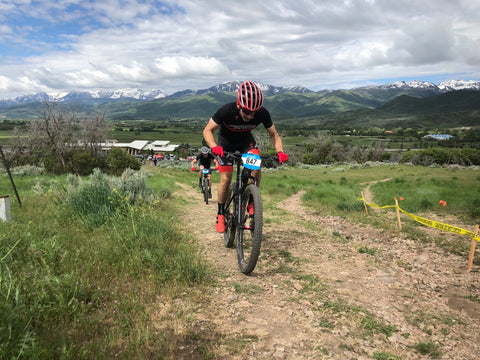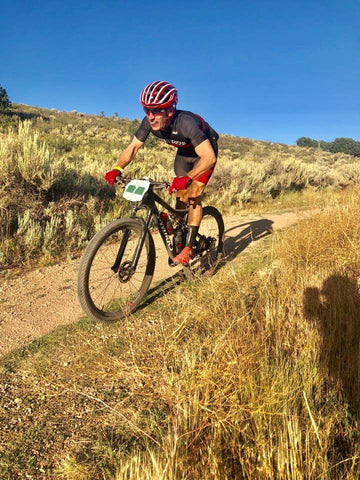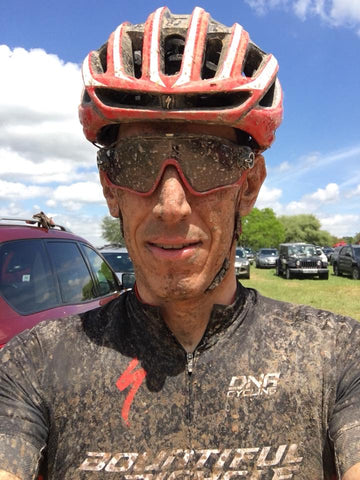
High Altitude Off-Road Everesting with Aaron Campbell

Just because races are on hiatus doesn’t mean we’ve all lost the desire to ride ourselves into complete exhaustion, sometimes we just need the right excuse. This week we sat down with veteran endurance mountain bike racer Aaron Campbell as he shares stories from his recent high altitude Everest challenge, past races, and SCC Tech tips and application techniques.
SCC: Thanks so much for joining us Aaron, we’ve crossed paths many times over the years at various mountain bike races across the country, it seems the more difficult the race the more likely you are to show up. What are some of your favorite races? Although at this point these all feel a little nostalgic we need some motivation for next year.
Aaron: I grew up on singletrack and living here in Utah there’s amazing trails. Park City just has such amazing riding that Point to Point is really high on my list. Leadville 100 has been a staple, this year would have been year number nine for me. One of my biggest accomplishments was going sub seven hours the other year. I love the Epic Rides race Series and the Whisky Off Road in particular. I throw in a little bit of gravel here and there like Crusher in the Tushars but I prefer mountain bikes when possible. Tahoe Trail 100 is a milestone check during the season since it’s in July and a few weeks from Leadville. It was the first race I did after breaking my leg five years ago.
SCC: What? Tell us about that!
Aaron: Well, True Grit is an early season standby race and that’s when I broke my leg back in 2015. I dropped down in the loose gravel at mile three and washed my front tire and got really unlucky. They’d gotten a lot of rain, the road was eroded and it was loose and sketchy. In the end I ended up with a rod in my leg.
SCC: Ouch! I remember being out at the 100 that year, I had no idea. How have you been training during the pandemic?
Aaron: Like everybody else, my racing days and events are on hold. It’s hard. I trained all spring, put in all that time on the trainer and then that reality hit in March when I put in the big block of training and now have to take a recess. Thankfully there’s lots of open space and I can get outside. Of course there’s Zwift and other virtual methods and more power to the people who can use them, but that would drive me nuts. Normally I’d be traveling for work, but now that I’m home I can right behind my house. I have a dirt road and gravel climb that goes 4,500’ to 9,500’ and as the snow melts you can go higher and higher.
SCC: You mention being home more, has your job been affected?
Aaron: I’m a mechanical engineer by schooling and in my job I work as a field application engineer of material testing.
SCC: You’re going to have to explain that a little more, that sounds pretty fancy.
Aaron: Basically materials testing involves breaking stuff in tension, compression or fatigue. Any product that’s made or produced has to be tested from carbon in a bicycle to a titanium. There’s a ton of R&D testing that goes into every product we buy.
SCC: So if our frame cracks you’re the guy to blame?
Aaron: Ha, I hope not. There’s a ton of R&D testing that goes into every product.
SCC: Recently you got some attention in the Utah mountain bike scene after your, we’ll call it insane, Eversting challenge. Most people we know opted for some nice clean road repeats at sea level but not you. Tell us about that.
Aaron: Well, my birthday is on D-Day and this year I was turning forty-four. D-Day was in 1944 so there were coincidental reasons. I thought it could be a way to honor the suffering that a lot of folks went through to accomplish an insurmountable task. I’d been kicking the idea around through the spring but about a month out, right about the time Keegan Swenson set the record, so when I heard he was going for it that was the additional motivation I needed. Shortly after that Rebeccca had her Giddy Up challenge and I almost shifted the date but the snowline was too low and we ended up getting a big storm that weekend so it wouldn’t have been possible.
 SCC: You know it’s going to be a tough challenge when your route gets snowed out in May.
SCC: You know it’s going to be a tough challenge when your route gets snowed out in May.
Aaron: Right? I was all set for my birthday on June 6th but I had to move it up a day after looking at the weather- there was a chance of thunderstorms and the thought of being in high country in a storm just seemed like a recipe for disaster.
SCC: So you're all set for the big day, you’ve got the route planned, aid station set up at the base. Tell us about the climb.
Aaron: My plan was six big laps to the summit with 5k climbing per lap. To do that you have to start on the lower slope, which is about 800 feet of pavement, so it’s like 85% dirt for the whole thing.
SCC: How did it play out? Did you manage to keep from getting snowed out?
Aaron: It turned out to be a brutally hot day with temperatures around 100 degrees but my Garmin recorded 126 degrees in the afternoon. In avoiding the storms I knew I would be riding on the hottest day of the week so I traded risks. I took the afternoon super cautions and drank lots of fluids.
SCC: And just how long were you out there suffering?
Aaron: It was 154 miles and just shy of 19 hours.
SCC: What! That’s insane.
Aaron: I could have stopped a little earlier but wanted to make sure I got over the line. You can’t simply trust that the elevation on the electronics will match the topo map when you upload the data. I always said I wouldn’t ever do it. Everesting is nutty but this was the year to give it a go with no reason to save the legs for races.
SCC: So what time of day did you start?
Aaron: I started at 12:23 am. I did not want to finish at night. I figured it was safer to finish during the day, and if I started in the middle of the night the chance of finishing, having dinner, and getting to bed would be more feasible.

SCC: And how did that plan work out? Any advice?
Aaron: Always take two lights. One of my lights died an hour in but thankfully my second light kept working. It was a full moon night so I could have theoretically gotten off the mountain safely.
SCC: Theoretically we’d still be out there right now trying to finish. Let’s talk gear- did you choose a hardtail or full suspension?
Aaron: Normally I’d take the hardtail but it’s a really rough dirt road. For one or two laps the hardtail would have been fine but for that long in the saddle I wanted the cushion. The first lap I felt things were super plush on the way down but by the last lap it felt like I was riding a rigid.
SCC: Did your brake pads hold up with 30k of dirt descents?
Aaron: I put fresh pads and rotors on for the ride. I ride that route enough that I know the lines, I may have topped out at 53mph. I’ve had really good luck with the XTR brakes and pads. I tried to not touch the brakes as much as I could. Even then I probably blew through at least half the pads.
 SCC: And because we make chain lube, we have to ask about your drivetrain. How did SCC Slick perform for your 19 hour Everest endeavor? How do you normally use SCC Tech and what did you do differently for such a long ride?
SCC: And because we make chain lube, we have to ask about your drivetrain. How did SCC Slick perform for your 19 hour Everest endeavor? How do you normally use SCC Tech and what did you do differently for such a long ride?
Aaron: Typically I apply SCC Slick every time I wash the bike, I clean it and it gets lube at that point. If it’s not too muddy then I lube the chain about once a month. Night before Everesting I did a full clean, took the chain off the bike and soaked it in rubbing alcohol then wiped it down and lubed it. The road itself gets really dusty but the chain stayed noise free. The other parts on the bike were making noise like the suspension but when I was sitting in the saddle the drivetrain wasn’t making any noise.
SCC: We love to hear that!
Aaron: Yeah, I had a bottle in the truck just in case I needed to reapply mid ride but I never even thought about it.
SCC: Any parting words?
Aaron: For all of us that race or do these long rides for ‘fun,’ that time on the bike is huge for me. It’s time to reflect on the world. When I was growing up an hour seemed like a long ride but now doing sixteen or more hours, you’ve got to train for it, but you can do so much more than you think you can. Being better than yesterday is my goal, on the bike and in life.
SCC: So true. Thanks so much for joining us Aaron and for the words of inspiration as well as your incredible effort out there putting SCC Slick to the ultimate test in extreme conditions. If you’d like to follow along with Aaron you can find him on Facebook.
